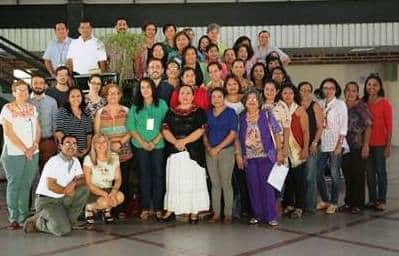UNESCO Discusses Results and Follow-up with the Minister of Social Inclusion

“It is a great opportunity that UNESCO has provided us with a common space for public servants, civil society, academics and international organizations to review public policies and to exchange about good practices in the field of gender equality”, said Loida Castro, a participant at UNESCO´s MOST School, in San Salvador.
A total of 54 students attended the 4 days school and over 2050 viewers followed the discussions of the conferences and panels through live streaming. The group, composed of a large number of gender experts and public servants representing 30 government departments, agreed on a set of commitments and follow-up actions including: reproducing the training at the national level, promoting inter- institutional collaboration, and supporting interdisciplinary gender research by establishing links between the sectors and focusing on specific issues.
Erlinda Hándal, Vice Minister of Science and Technology welcomed this initiative and congratulated the MOST programme for promoting this link between academia and policy making in the country. MOST is an intergovernmental progamme that is supporting research to policy links through Ministerial forums, research, and capacity building.
This MOST School was co-organized with the Latin American Council for Social Sciences (CLASCO), the Central American University “José Simeón Cañas” (UCA) and the Ministry of Education. It gathered together a prominent group of experts representing the Association of Sociology of El Salvador, the Technical Secretariat of the Convention Belem do Pará of the Organization of American States (OAS), FLACSO Guatemala, and UCA.
“This was a unique opportunity to have access and get in touch with such a group of experts”, explained a participant.
At the end of the School a delegation, led by UNESCO, and composed of CLACSO, OAS and UCA met with the Minister of Social Inclusion, Vanda Pignato, to present her with the results of the School and follow-up action. Ms. Pignato expressed interest in creating synergies and organize further trainings, based on the MOST School methodology and materials, in alliance with the Ministry´s School for Equality. The Department of Sociology and the Vice Rector of Academic Affairs of UCA also expressed interest in developing further gender trainings based on this recent experience of MOST.
Charaf Ahmimed, Programme Specialist with UNESCO Cluster Office for Central America explained that the trainees will have access to all material in a digital form so they can be able to use it for further trainings in their institutions and the country.
The MOST School ended with and agreed outcome document.
For further information about the MOST Programme in Central America, please contact Charaf Ahmimed at c.ahmimed(at)unesco.org
